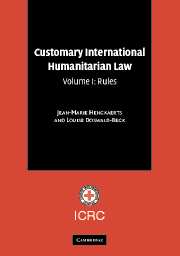Book contents
- Frontmatter
- Contents
- Foreword by ICRC President Jakob Kellenberger
- Foreword by Judge Abdul G. Koroma
- Foreword by Yves Sandoz
- Acknowledgements
- Introduction
- List of abbreviations
- Part I The Principle of Distinction
- Part II Specifically Protected Persons and Objects
- Part III Specific Methods of Warfare
- Part IV Weapons
- Part V Treatment of Civilians and Persons Hors De Combat
- Chapter 32 Fundamental Guarantees (Rules 87–105)
- Chapter 33 Combatants and Prisoner-of-War Status (Rules 106–108)
- Chapter 34 The Wounded, Sick and Shipwrecked (Rules 109–111)
- Chapter 35 The Dead (Rules 112–116)
- Chapter 36 Missing Persons (Rule 117)
- Chapter 37 Persons Deprived of Their Liberty (Rules 118–128)
- Chapter 38 Displacement and Displaced Persons (Rules 129–133)
- Chapter 39 Other Persons Afforded Specific Protection (Rules 134–138)
- Part VI Implementation
Chapter 39 - Other Persons Afforded Specific Protection (Rules 134–138)
Published online by Cambridge University Press: 05 June 2012
- Frontmatter
- Contents
- Foreword by ICRC President Jakob Kellenberger
- Foreword by Judge Abdul G. Koroma
- Foreword by Yves Sandoz
- Acknowledgements
- Introduction
- List of abbreviations
- Part I The Principle of Distinction
- Part II Specifically Protected Persons and Objects
- Part III Specific Methods of Warfare
- Part IV Weapons
- Part V Treatment of Civilians and Persons Hors De Combat
- Chapter 32 Fundamental Guarantees (Rules 87–105)
- Chapter 33 Combatants and Prisoner-of-War Status (Rules 106–108)
- Chapter 34 The Wounded, Sick and Shipwrecked (Rules 109–111)
- Chapter 35 The Dead (Rules 112–116)
- Chapter 36 Missing Persons (Rule 117)
- Chapter 37 Persons Deprived of Their Liberty (Rules 118–128)
- Chapter 38 Displacement and Displaced Persons (Rules 129–133)
- Chapter 39 Other Persons Afforded Specific Protection (Rules 134–138)
- Part VI Implementation
Summary
Rule 134. The specific protection, health and assistance needs of women affected by armed conflict must be respected.
Note: International humanitarian law affords women the same protection as men – be they combatants, civilians or persons hors de combat. All the rules set out in the present study therefore apply equally to men and women without discrimination. However, recognising their specific needs and vulnerabilities, international humanitarian law grants women a number of further specific protections and rights. The present rule identifies certain of these additional protections and rights.
Practice
Volume II, Chapter 39, Section A.
Summary
State practice establishes this rule as a norm of customary international law applicable in both international and non-international armed conflicts. The practice collected with regard to the specific needs of women is reinforced by and should be viewed in the light of the specific practice relating to the prohibition of sexual violence (see Rule 93) and the obligation to separate women deprived of their liberty from men (see Rule 119), as well as the prominent place of women's rights in human rights law.
International armed conflicts
The rule that the specific needs of women affected by armed conflict must be respected flows from provisions found in each of the four Geneva Conventions. The First Geneva Convention, for example, requires that “women shall be treated with all consideration due to their sex”. Additional Protocol I provides that “women shall be the object of special respect”.
- Type
- Chapter
- Information
- Customary International Humanitarian Law , pp. 475 - 492Publisher: Cambridge University PressPrint publication year: 2005

